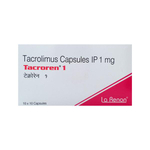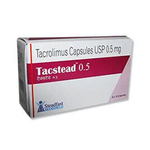pangraf (TACROLIMUS)
Introduction to Pangraf
Pangraf is a medication primarily used to prevent organ rejection in patients who have undergone an organ transplant, such as a kidney transplant. It works by suppressing the im... See More

What is Pangraf?
Pangraf is a medication used to prevent rejection of organ transplants. It works by suppressing the immune system, which helps to prevent the body from attacking the transplanted organ. Pangraf is typically used in combination with other medications to prevent rejection.

What is the usual dose of Pangraf?
After a kidney transplant, adults usually start taking a medicine called Pangraf (an extended-release capsule). The doctor will figure out the right dose based on your weight, aiming for a certain amount of the medicine in your blood. This medicine is taken with other medicines to help prevent your body from rejecting the new kidney. The amount of Pangraf in your blood will be checked regularly, and your dose will be adjusted as needed to keep it within the safe range. This ensures the new kidney is protected, and the medicine works as it should.

How do I take Pangraf?
Take your Pangraf capsules whole, every morning at the same time. It's best to take them on an empty stomach, either an hour before or two hours after eating. Don't eat grapefruit or drink grapefruit juice while taking this medicine.

For how long do I take Pangraf?
Pangraf is typically taken long-term or indefinitely in transplant patients to prevent organ rejection. The exact duration depends on your medical condition and response to treatment, as determined by your doctor.

What is Pangraf used for?
Pangraf is a drug that helps prevent the body from rejecting a new kidney after a transplant. It's only for adults who've had a kidney transplant and must be used with other medications. It hasn't been tested on children, so it's not safe or effective for them.

How long does it take for Pangraf to start working?
Pangraf typically starts working within 1 to 3 days, as it quickly suppresses the immune response. However, the full therapeutic effect, particularly in conditions like organ transplantation or autoimmune diseases, may take 1 to 2 weeks or longer to become evident. Regular blood level monitoring ensures the drug reaches its effective concentration.

Is Pangraf effective?
Clinical trials have shown Pangraf to be effective in reducing the incidence of organ rejection. When taken as directed, it significantly improves transplant outcomes compared to alternatives.

How does one know if Pangraf is working?
Effectiveness is monitored through blood tests measuring Pangraf levels, kidney function tests, and clinical observation for signs of organ rejection

How does Pangraf work?
Pangraf binds to FKBP-12, forming a complex that inhibits calcineurin, an enzyme critical for activating T-cells. This reduces the production of inflammatory cytokines, preventing immune system attacks on transplanted organs.

Who should avoid taking Pangraf?
Pangraf extended-release capsules can have serious side effects, like a higher chance of getting cancer, infections, kidney or nervous system issues, high blood pressure, and blood clots. It can also raise your blood sugar and potassium levels. Don't take it if you're allergic or have had a liver transplant without talking to your doctor first. Tell your doctor about any liver, kidney, or heart problems you already have. If you could get pregnant, use birth control.

Can I take Pangraf with vitamins or supplements?
Pangraf may interact with supplements, especially those containing magnesium or aluminum, which can affect its absorption. Always consult your doctor before starting any new vitamins or supplements.

Can I take Pangraf with other prescription drugs?
Pangraf extended-release capsules interact with many things, so it's crucial to tell your doctor about *everything* you take—prescription drugs, over-the-counter meds, vitamins, supplements, and even alcohol. Some things can change how much Pangraf is in your blood, possibly needing a dose change. Avoid grapefruit and grapefruit juice. Taking it with certain other drugs (like sirolimus or everolimus) raises your risk of blood clots.

Can Pangraf be taken safely while pregnant?
Pangraf is a medicine that can hurt an unborn baby. Studies show it may lead to premature birth, birth defects, low birth weight, and problems for the baby during pregnancy.

Can Pangraf be taken safely while breastfeeding?
Pangraf extended-release capsules and Envarsus XR are medicines that can get into breast milk. You and your doctor need to talk about whether breastfeeding is safe for your baby while you're taking these medications. You'll need to weigh the good things about breastfeeding for your baby against any possible bad effects the medicine might have on them.

Is Pangraf safe for the elderly?
Older adults often need lower doses of medicine than younger people. This is because their livers, kidneys, and hearts may not work as well, and they might be taking other medications. Doctors don't have a lot of research on how medicines work in older people, so they start with a low dose to be safe.

How should I store Pangraf?
Keep the medicine at room temperature (around 77°F or 25°C). It's okay if the temperature goes a little higher or lower, between 59°F (15°C) and 86°F (30°C). The medicine comes in a box with 5 strips of 10 capsules each, all in foil.

Does Pangraf make people tired or drowsy?
Fatigue or drowsiness is not a common side effect. If experienced, report it to your doctor for further evaluation

Does Pangraf cause stomach upset?
Yes, gastrointestinal side effects such as diarrhea (31%) and nausea (13%) are common. Consult your doctor if symptoms persist

Does Pangraf affect sleep?
This medicine might make you sleepy. If you have trouble sleeping because of it, talk to your doctor right away.

Does Pangraf make it hard to think or concentrate?
Pangraf can cause neurological effects like confusion or tremors in some patients. Report any cognitive issues to your doctor promptly

Does Pangraf affect mood?
Mood changes are rare but possible. If you notice significant emotional or behavioral changes, consult your healthcare provider.

Does Pangraf interfere with sexual function?
Sexual side effects are uncommon but possible. If you experience issues, discuss them with your doctor

Does Pangraf affect appetite?
Changes in appetite are rare. Significant alterations in eating habits should be reported to your healthcare provider

Does Pangraf cause weight gain?
Weight gain is not commonly reported. If significant changes in weight occur, inform your doctor

Does Pangraf cause headaches?
Pangraf capsules can sometimes cause headaches. If you get a headache while taking this medicine, call your doctor right away.

Does Pangraf limit driving?
Pangraf may cause tremors or dizziness, potentially impairing driving ability. Avoid driving if these symptoms occur.

Is it safe to drink alcohol while taking Pangraf?
Pangraf is a strong medicine. Alcohol can make it harder for your body to use Pangraf correctly, or it can make the medicine less effective. This could mean your treatment doesn't work as well as it should. It's best to avoid alcohol completely while you're taking this medicine.

Is it safe to drink coffee or tea while taking Pangraf?
Moderate caffeine consumption is generally safe, but excessive intake may worsen side effects like tremors or insomnia. Keep intake moderate

Is it safe to exercise while taking Pangraf?
Exercise is safe, but avoid overexertion, especially if experiencing tremors, fatigue, or dizziness. Stay hydrated and consult your doctor

What are Pangraf possible harms and risks?
Pangraf can cause common problems like diarrhea, constipation, nausea, swelling, and shaking. More serious, but less common, problems include kidney issues, nervous system problems (like confusion, numbness, or seizures), high blood pressure, high blood sugar, high potassium, and blood clotting problems. A fruity breath smell with nausea, vomiting, or stomach pain is a serious warning sign.
Available in 5 variations
Pangraf 5mg Capsule 10s
Tacrolimus (5mg)
strip of 10 capsules
Pangraf 0.25 Capsule 10s
Tacrolimus (0.25mg)
strip of 10 capsules
Pangraf 0.5mg Capsule 10s
Tacrolimus (0.5mg)
strip of 10 capsules

Pangraf 2mg Capsule 10s
Tacrolimus (2mg)
strip of 10 capsules
Pangraf 1mg Capsules 10s
Tacrolimus (1mg)
strip of 10 capsules









.svg)
